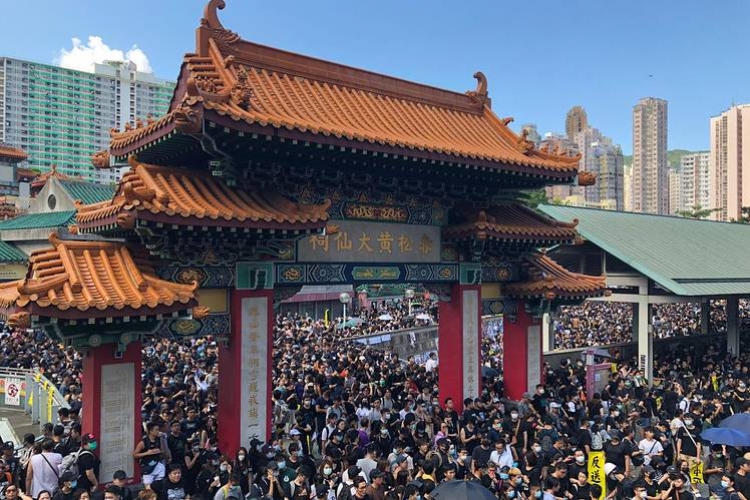Hong Kong Crisis: What is it all about ?
Hong Kong Crisis
The special status of HK with China
Hong Kong, officially the Hong Kong Special Administrative Region of the People's Republic of China, is a special administrative region. Hong Kong island became a colony of the British Empire at the end of the First Opium War in 1842, followed by Kowloon in 1860 after the Second Opium War, and the modern territory was completed in 1898 with a 99 year British lease( Treaty of Nanking) over the New Territories, which comprise 86% of Hong Kong's land. Sovereignty over the territory was restored to China in 1997 and China would guarantee Hong Kong's economic and political systems for 50 years after the transfer—" one country, two systems"
Hong Kong is a special administrative region of China, with executive, legislative, and judicial powers devolved from the national government. The Sino-British Joint Declaration provided for economic and administrative continuity through the transfer of sovereignty, resulting in an executive-led governing system largely inherited from the territory's history as a British colony. Under these terms and the "one country, two systems" principle, the Basic Law of Hong Kong is the regional constitution
The curious case of Democracy
Political debates after the transfer of sovereignty have centred around the region's democratic development and the central government's adherence to the "one country, two systems" principle. After reversal of the last colonial-era Legislative Council democratic reforms following the handover, the regional government unsuccessfully attempted to enact national-security legislation pursuant to Article 23 of the Basic Law. The central government decision to implement nominee pre-screening before allowing Chief Executive elections triggered a series of protests in 2014 which became known as the Umbrella Revolution. Discrepancies in the electoral registry and disqualification of elected legislators after the 2016 Legislative Council elections and enforcement of national law in the West Kowloon high-speed railway station raised concerns about the region's autonomy. In June 2019, large protests again erupted in response to a proposed bill permitting extradition of fugitives to mainland China. China's semi-autonomous city of Hong Kong has been rocked since April by increasingly violent protests that were sparked by a proposed extradition law.
The Fugitive Offenders and Mutual Legal Assistance in Criminal Matters Legislation (Amendment) Bill 2019
This is a proposed bill regarding extradition to amend the Fugitive Offenders Ordinance in relation to special surrender arrangements and the Mutual Legal Assistance in Criminal Matters Ordinance so that arrangements for mutual legal assistance can be made between Hong Kong and any place outside Hong Kong. The bill was proposed by the Hong Kong government in February 2019. The government proposed to establish a mechanism for transfers of fugitives not only for Taiwan but also for Mainland China and Macau, which are not covered in the existing laws.
The introduction of the bill caused widespread criticism domestically and abroad from the legal profession, journalist organisations, business groups, and foreign governments fearing the erosion of Hong Kong's legal system and its built-in safeguards, as well as damaging Hong Kong's business climate. They were concerned about the heightened risk that Hong Kong citizens and foreign nationals passing through the city could be sent for trial to Mainland China, where courts are under Chinese political control. Authorities in Taipei stated that Taiwan would not agree to extradite any suspects from Hong Kong, on grounds that Taiwanese citizens in Hong Kong would be at greater risk of being extradited to Mainland China under the proposed bill, and suggested that legislation was politically motivated. The Hong Kong government's rush to implement the legislation to extradite also gave rise to a precedent to short-circuit procedural safeguards in the Legislative Council.
HK Protests
Tens of thousands of people march peacefully against a local government Bill that would allow, for the first time, extraditions to mainland China. There are fears the law will tighten Beijing's grip on civil society and allow it to pursue its political enemies in Hong Kong.
Despite government tweaks to soften the law, tens of thousands more protest again. It descends into violence after midnight when police, using batons and pepper spray hoses, try to disperse small groups of protesters who hurl bottles and use metal barricades. At least 2,40,000 people participated in protests and 19 people were arrested. Huge crowds block major roads and attempt to storm Parliament, delaying Bill's second reading. Police use tear gas, pepper spray, rubber bullets and bean-bag rounds in the worst clashes since the handover. Nearly 80 people are injured.
Later, Hong Kong leader Carrie Lam postpones the Bill, but a fresh demonstration the next day calls for its full withdrawal. The Bill is dead. Just ahead of an annual march to mark Hong Kong's return to China, young masked protesters take over key roads, sparking new clashes with police. Later in the day hundreds smash their way into Parliament and ransack the building, daubing its walls with anti-government graffiti. As Hong Kong buckles under increasingly violent clashes between protesters and police in a deepening political crisis, hundreds gathered at the harbourfront for a markedly different kind of protest: a laser show. Both police and protesters have used intense beams of light against each other, turning often violent episodes into surreal scenes fit for a disco or science fiction. Demonstrators have aimed lasers towards riot police, irritating them by flashing at their faces as well as their surveillance cameras to counter facial recognition.
How India pursued its self-interest
Indian government saw an opportunity in China’s internal crisis and moved towards scrapping article 370 of the Indian constitution. India sited panchsheel and the international principle of sovereignty and claimed it as an internal affairs matter and asking China and Pakistan not to involve in Internal matters of India. It is to be interestingly noted that China uses the same “Internal affairs “ play card in its HK crisis.


 "UPSC-2026-PRELIMS COMBINED MAINS FOUNDATION PROGRAMME" STARTS WITH ORIENTATION ON FEB-10
"UPSC-2026-PRELIMS COMBINED MAINS FOUNDATION PROGRAMME" STARTS WITH ORIENTATION ON FEB-10